Disclosure: Meeple Mountain received a free copy of this product in exchange for an honest, unbiased review. This review is not intended to be an endorsement.
I love a good logic puzzle. Games like HABA’s The Key series, The Search for Planet X, Decrypto, Codenames XXL, Awkward Guests, Cryptid, and many other deduction games are the types of experiences I will always try. (One game I won’t try: Alchemists. I have rules about long games, especially ones that overstay my body’s interest in solving a grand deduction puzzle!)
I used to love the parts of those old SAT tests when the logic problems showed up on the math portion of the exam: Lamont and Sally walk X miles, then pick up groceries, but then Sally takes the long way back, while high-fiving 40 of their best friends. What time is it?
Ridiculous, right? Love those brain teasers. That’s why Turing Machine (from Le Scorpion Masqué) was so high on my list. The game was so hot at Gen Con 2022 that media members couldn’t grab a copy, so I tried to stay patient while our friends at the publisher secured a review copy.
Once the game is in hand, Turing Machine is easy to get to the table because its playtime is so brief. If you love a good logic puzzle, Turing Machine fills a brand new niche for me: the 15-minute punch card deduction game.
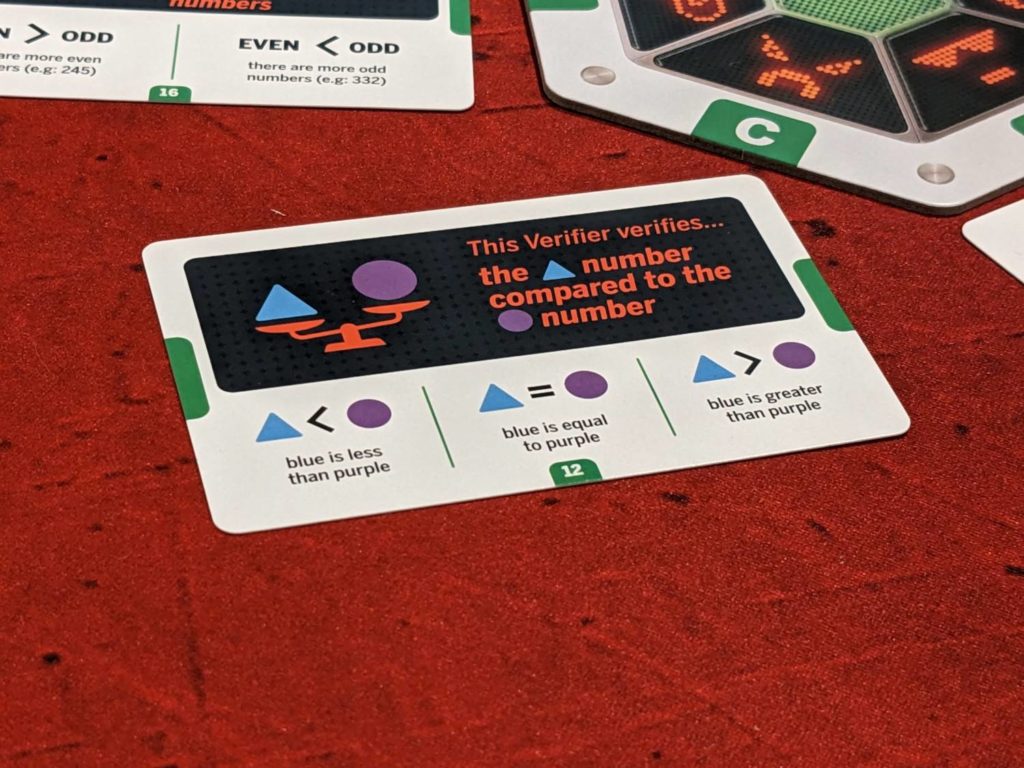
Verifying the Problem
Turing Machine’s success—and potential failure—lies with the way it uses its punch card computer system.
A game of Turing Machine revolves around the use of criteria cards to uncover the secret three-digit code established at setup. Each player is armed with a scoring/notes sheet. In the center of the table is the set of that game’s 4-6 criteria cards, situated around a central tile. These cards suggest various rules that the secret code might follow. At the end of each criteria card, a Verification card is placed that will be used by all players looking to test that specific criteria card.
During a round, players can test up to three of the criteria. They do this by first coming up with a three-digit number, using only the numbers one through five. (312 is quite popular here in Chicago.) Each player grabs the appropriate punch cards from a display to form their number, then holds their punch cards up to the Verification card. Cut-outs on the card allow players to see whether each digit in their guess matches the criteria listed.
Rounds continue until someone believes they have the solution, then they test this guess to confirm a winner. A game of Turing Machine usually lasts at least two rounds, and sometimes a lot more based on the complexity of the game format (competitive or cooperative) chosen during setup.
Turing Machine, with new players, rises or falls based on how players read the data validated by each Verification card. That’s because the punch cards only help you verify that you are on the right track, not that you have the right answer. Misreading this literally breaks the game.
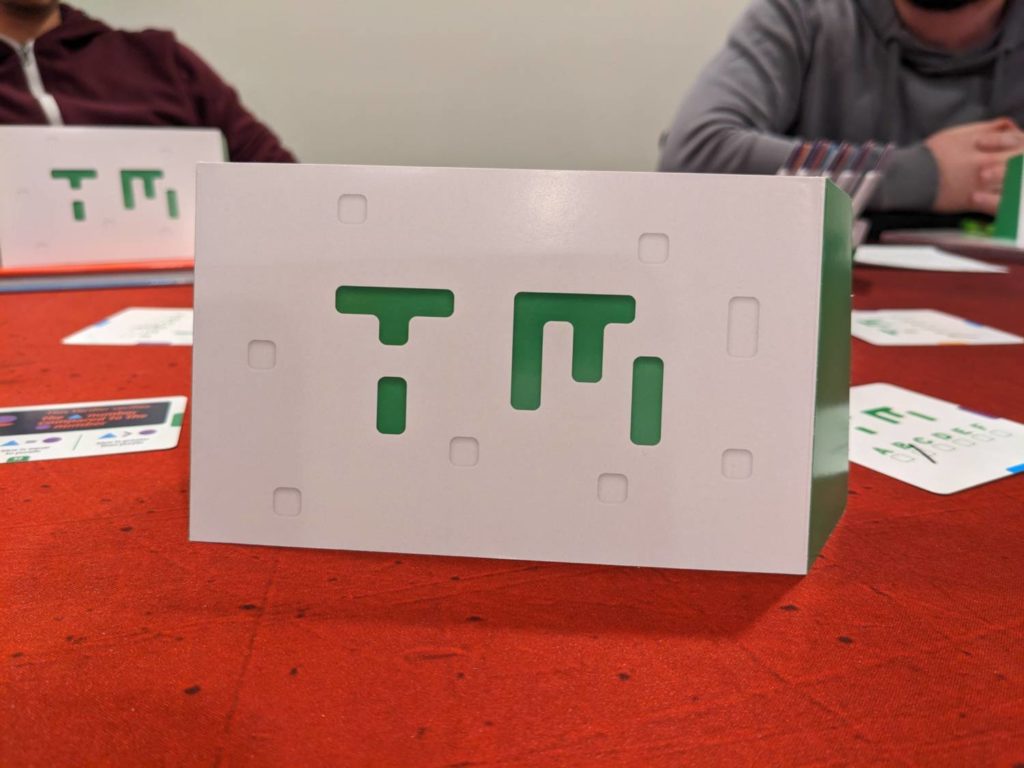
Here’s an example, and let’s pretend this example’s correct answer is 423.
Teddy looks at a criteria card and it reads that “This Verifier proves that the first number in the code is even.” His proposed clue is 245. When Teddy holds up the punch cards to this criteria’s Verification card, he will see a green check mark.
This means that the logic Teddy has presented is correct: the final answer’s first digit is, in fact, even because he tested that logic by making the first digit in his guess an even number. It does NOT guarantee that the first digit is a two. It might be a two, because two is an even number. But if Teddy sees that check mark and thinks “aha…it’s a two!”, his round is not going to work out.
Players were regularly getting this wrong in my plays. I admit that I was constantly reminding myself that this is how Turing Machine works. By play number five, you’ll have this down. But at family game night, during a one-time-only play of Turing Machine, someone is going to chuck something at the wall in frustration as you explain to them, over and over, that cards are only used to verify the logic behind the clues, not the answers.
If you can clear this hurdle, Turing Machine brings the goods.
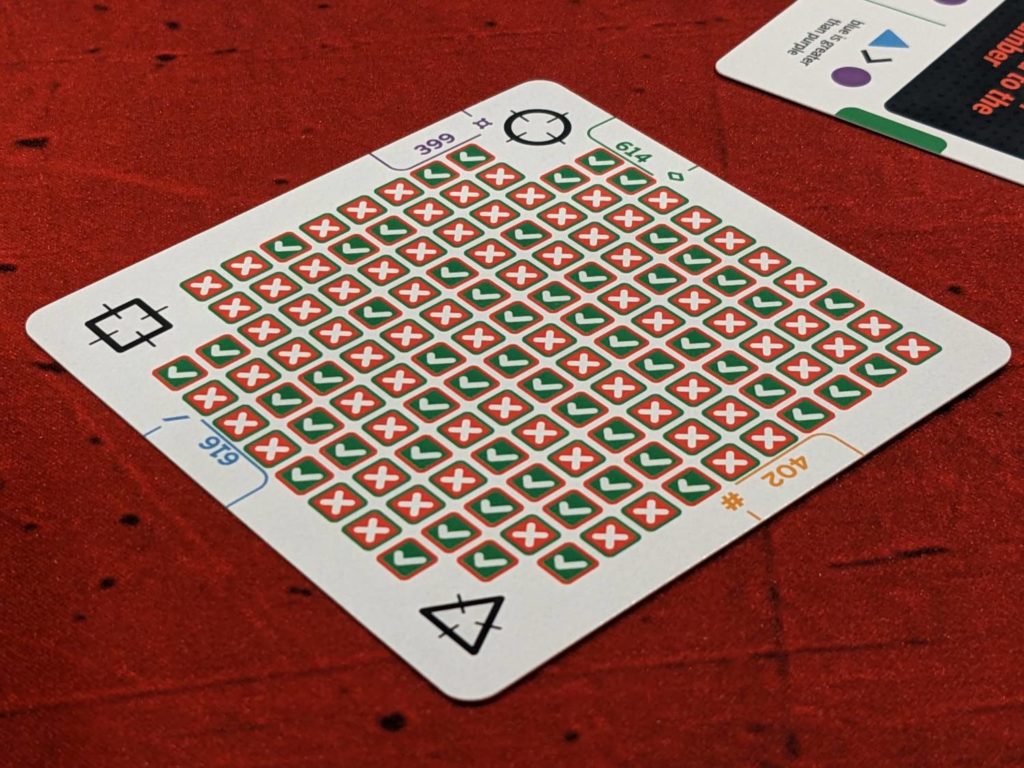
Get In, Get Out
Turing Machine’s gameplay is excellent and some games take less than 10 minutes. On the hardest difficulties available, Turing Machine takes a lot longer, but the extra time will lead to some very satisfying finishes.
That satisfaction starts with the production. The box is maybe the coolest game box I’ve seen, in terms of its partially cut-out cover. The rulebook is slick, the cards all look great, and placing Verification cards behind the punch cards hasn’t gotten old yet. There’s plenty of room on the worksheets to take lots of notes. I would prefer dry-erase boards, but I wonder if they were not included because players kept accidentally erasing their information while working through a round during playtests.
Although there are a few puzzles included in the physical rulebook, there are millions more available in the game’s app. The app is easy to use and it is only needed to set up a game and test for solutions, otherwise there’s no moment-to-moment interaction with the app. Each game has a specific log-in code that all players at the table can use if they want to verify without using a central device for testing.
While competitive and cooperative play modes are available, I think Turing Machine works best as a solo game. Going alone lets you get around one of the only consistent problems I’ve seen across my five plays so far: waiting on one or two people to think through their read of the data before verifying whether one player has enough info to win. The game has almost no interaction, and besides, the smartest person at your table is going to win every single time. (Turing Machine does feature a little luck, especially if you pick a clue that happens to check a lot of Verification cards. But over time, your “smartypants” friend is gonna win this game a lot.)
When playing solo, you don’t have to wait on anyone. Or, if you prefer, you can take all the time in the world. Some players will prefer that anyway, and you still get the haptic sensation of pulling out those punch cards to see if you’ve solved the riddle.
No matter the player count, Turing Machine is quality stuff and now I can offer a solid short deduction option on game night. Give Turing Machine a look if you love trying to solve for X!


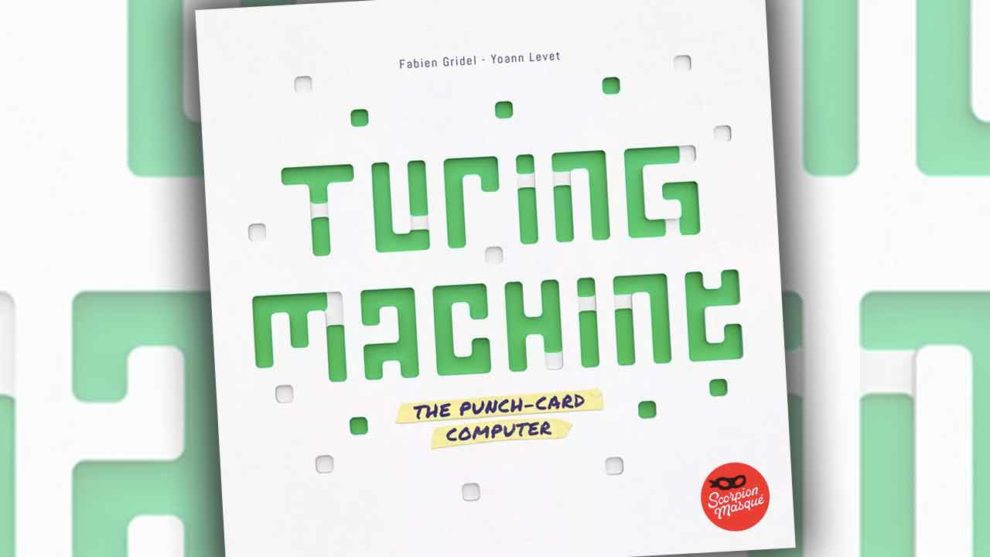

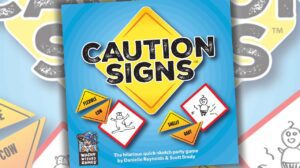







Hi!
I also love deduction games and i’m a computer programmer so Turing Machine is in on my wishlist for so long. But… what do you thing of this game if we compare with Cryptid or “The search for planet X”? These was two of my favourite games.
Do you think is a must?
Thanks
I liked Cryptid and I loved Search for Planet X; I think Turing Machine fits in nicely as a shorter version of both of those other games. If you only have 15 minutes, Turing Machine is the pick. 30 minutes=Cryptid. An hour=Search for Planet X. Hope this helps and happy gaming!